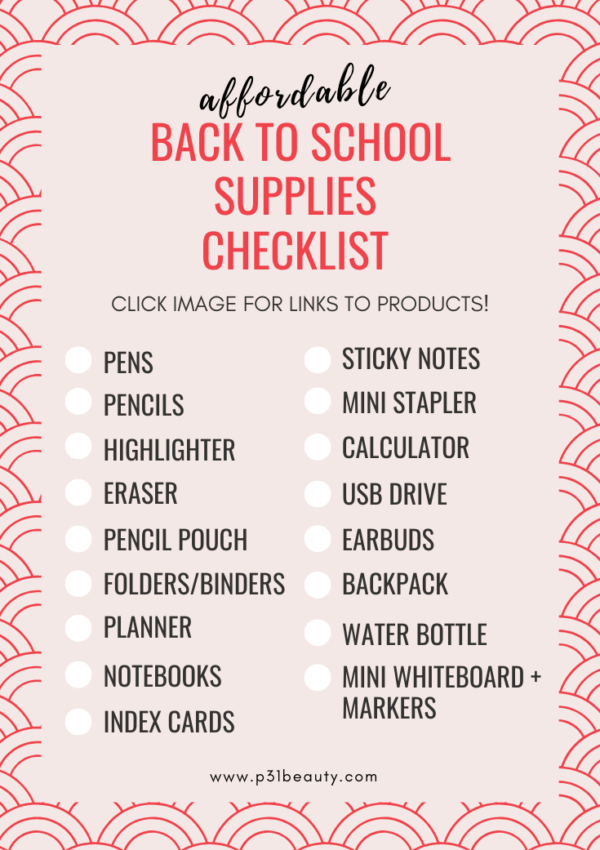
Although 2020 is pretty much going on a downhill trend, that doesn’t mean your grades this school year should too! Since it’s back to school season, I know that a lot of you are mentally preparing for your new classes and setting goals to get good grades. In this post, I am going to be giving you some realistic tips on how to get a 4.0 GPA this year.
As you know, I recently graduated from UC San Diego as a Biochemistry and Cell Biology major with a 3.96 overall GPA. I received Summa Cum Laude honors, which is the highest honor awarded to the top 2% of the graduating class. As a college student who had to balance work, volunteering, and running a student organization, maintaining a high GPA was extremely difficult. I definitely had my fair share of struggles and 3 A.M breakdowns! However, through learning from my mistakes, I was able to figure out what worked best for me, and I want to share all my tips with you!
Related: Top 10 College Dorm Room Must Haves for 2020
Related: 10 Super Helpful Tips for Taking Online Classes and Staying Motivated
Here are 12 realistic tips on how to get a 4.0 GPA this year!
1. Do what you have to do, even if it means making sacrifices.
No one said that getting a 4.0 GPA would be easy. If you have a super busy schedule with work and extracurriculars, it’s inevitable that you’ll have to sacrifice certain things for the grade you want. This could mean getting less sleep, hanging out with friends less often, or spending less time on social media or Netflix. Have you ever heard of the quote below?

Now, I don’t recommend taking this quote too literally because your physical and mental health is significantly more important than a number (more on this later!). However, when taken lightly, it’s a funny and relatable quote. At the end of the day, you get what you worked for!
2) Plan your weekly and daily tasks ahead of time. AVOID PROCRASTINATION.
This section was taken from my recent post: 10 Super Helpful Tips for Taking Online Classes and Staying Motivated
At the start of the week, plan your workload for each day on a calendar or planner. Once that day arrives, create a separate checklist with times assigned for each task. Setting a schedule for yourself ahead of time will keep you organized and held accountable. Avoiding procrastination and staying on top of your work will also free up more time for you to have fun, watch Netflix, or pursue other hobbies. Here’s what I do:
Using Google Docs, I created a calendar where I include all of my exams (bolded in red), assignment due dates (bolded in black), and tasks for the day (bullet points). Each class is highlighted a different color. At the end of the day or when I finish all my tasks, I highlight the entire box pink. On Sundays, I like to type out what I plan to do for each class on each day of that particular week. The reason why I use Google Docs to plan all my work is because it’s easy to edit and move things around.
Click here to download your free calendar for the quarter (10 Weeks) or semester (15 weeks)!

GET YOUR FREE CALENDAR FOR THE QUARTER OR SEMESTER TODAY

Trust me. This free calendar will make your life so much more organized! Click the button below to receive it directly in your inbox.
In the morning, the first thing I do is look at my calendar and see what I need to get done for the day. I copy and paste my tasks for the day onto Google Keep and assign times for when I’m going to do each task. This keeps my day scheduled and organized. Here’s an example for April 21:

3. Try to stay engaged during lecture.
College is rough, and I know that most of us are sleep deprived and probably don’t have the capacity to completely focus during lecture. My advice is to just try to stay engaged during lecture by maybe sitting towards the front of the class or keeping your phone away. Do what works best for you in order to stay focused!
When you’re actively learning while taking notes, this reduces the amount of time that you have to spend trying to understand what you copied down on your own time. This means less time preparing to study for the test and more time for actually studying. It’s little tips like these that help you save time in the long run, especially when you’re taking 4 classes on top of your other commitments.
Related: Best Advice for Incoming College Freshmen. Your Top 20 Questions Answered!
4. Start preparing for an exam around 1-2 weeks in advance.
This is where your planning and time management skills come in handy. If you have enough time, I suggest that you start preparing for an exam around 1-2 weeks before the exam date. Notice how I used the word prepare. For me, preparing for an exam means making sure that I understand the material by taking notes from the textbook and/or rewatching lectures. It’s good to start preparing for an exam early so that you have enough time to actually memorize the material and/or do practice problems for the test. Every class is different, so the amount of time you need to study really depends on how clear your professor is during lecture, how fast you absorb the material, and how difficult the class is.
Let’s say that I have a class that’s very memorization heavy (ex: Biochemistry), so I have to rewatch the 8 lectures to make sure I got all the notes down. Here’s a breakdown of what I would do if I gave myself around two weeks to study for the class’s midterm:
Week 1: Preparing for the exam
MONDAY: Rewatch lectures 1 & 2
TUESDAY: Rewatch lectures 3 & 4
WEDNESDAY: Rewatch lectures 5 & 6
THURSDAY: Rewatch lectures 7 & 8
FRIDAY: Make sure I’m caught up with all the lectures and understand what’s going on. Rest day before studying.
Week 2: Studying for the exam
SATURDAY: Memorize information from lectures 1-3
SUNDAY: Memorize information from lectures 4-6 ; actively review lectures 1-3 info
MONDAY: Memorize information from lectures 7-8 ; actively review lectures 1-6
TUESDAY: Do practice problems ; Actively review lectures 1-8
WEDNESDAY: Do practice problems ; Actively review lectures 1-8
THURSDAY: Review any weak areas and get good night’s sleep!
FRIDAY: TEST DAY!!
5. Study with zero distractions.
Try to reduce the amount of distractions you have while studying. This may include studying alone, studying in the library with no noise, and shutting down social media for a while. Studying with zero distractions will help reduce the amount of study time, giving you more free time to do other things!
Related: 10 Must Have iPad Apps for College (What’s on My iPad Video)
6. If you don’t get a good grade on the first test, it’s okay!
There have been so many times when I would not do as well as I wanted on my first midterm or quiz but ended up getting an A as my final grade in the class. Although it is discouraging that you studied so hard but didn’t get the grade you expected, you need to just learn how to accept it. Don’t beat yourself up for it because it’s not your fault! It was the first test and there was no way you’d know how the test would be formatted and what kind of questions would be on it. Instead of freaking out, pick yourself back up, learn from your mistakes, and start focusing on your next exam.
7. Find a way to handle your stress.
I don’t know if your mind works this way, but let me give you a glimpse of how my mind functions. When you’re aiming for the very best (such as grades), you begin to add extra pressure on yourself. Suddenly, everything you do must be perfect (aka getting A’s) because anything short of perfection (aka getting anything below an A) feels like you’re failing. When you don’t meet those expectations, that pressure turns into stress- the constant worry that you’re going to fail and you’re not going to achieve your goals.
If you related to the last paragraph, please hear me out. I am speaking from many nights of tears and breakdowns!! You must find a way to handle your stress because if you let it build up, you will crash and burn. When you’re stressed out, you spend too much time and energy worrying about the worst case scenario that you begin to lose focus of your goal. Isn’t it ironic how stress, a product of caring too much, can lead to your downfall?
Remember, less stress means more time and energy for achieving your goals. Stress management is something that I still need to work on, but here are some things that I do to lower my stress:
- Cry it out. Honestly, sometimes you just need a good ugly cry, and that makes you feel so much better. Don’t ask me why.
- Vent out your feelings to a friend.
- Take a break. Stop studying and address how you’re feeling. What is your worst case scenario? Now, I don’t want you to start freaking out about it. I want you to think about the steps you’re going take right now to avoid that worst case scenario. You can’t change the past but you can control what you’re doing in the present.
- Accept that you’re not perfect. You’re human, you make mistakes, but you are also resilient. When you’re emotionally ready, bounce back,
Related: Everything You Need to Pack for Your Dorm in 2020 + Free Printable Checklist!
GET YOUR FREE COLLEGE PACKING LIST TODAY

Trust me. This free college packing list will make packing so much easier for you! Click the button below to receive it directly in your inbox.
8. Don’t be afraid to ask questions.
As someone that’s not the most outgoing person, I know that it can be scary to ask questions during lecture or class. If you are ever nervous, just think about how there is someone else who most likely has the same question as you. What’s more important? How a bunch of random people in your class will perceive you or your grade in the class? In case you really don’t want to ask on the spot, you can always email your professors and TA’s or go to office hours!
9. Some professors SUCK. So suck it up.
Oh my goodness. During college you will encounter professors that are not good at teaching, don’t care about their students, and/or make the class extremely hard. Although the situation absolutely sucks and you are completely entitled to complain, don’t let this stop you from doing whatever it takes to get the grade you want.
I suggest looking into free tutoring offered by your school, reading the textbook, forming a study group, watching videos on Youtube or Khan Academy, or reading online tutorial articles.
Related:Cheap Back To School Supplies for 2020-2021 + Free Checklist
GET YOUR FREE BACK TO SCHOOL SUPPLIES CHECKLIST TODAY

Trust me. This free back to school supplies list will make shopping so much easier for you! Click the button below to receive it directly in your inbox.
10. Use online resources to your make your life easier.
Let’s be honest. Sometimes, you don’t have enough time to read a whole novel in one week, graph equations by hand, or create flashcards. Here are some of my favorite online resources that I’ve used throughout high school and college. Use them to your advantage, but don’t rely on them to the point where you don’t understand the content!
The section below was taken from my post How to Get Good Grades in School This Year: The Ultimate Guide from January 4, 2018.
ENGLISH
- Sparknotes:provides chapter summaries and analysis for nearly all the books that you will read in high school. For some Shakespeare plays, you can read the original play along with a modern translation.
- Shmoop: This website also provides chapter summaries that are outlined and more detailed.
- Easybib: This website generates citations for you. It comes in handy when writing essays that have a lot of sources!
- Purdue Owl: If you ever have questions about how to write an essay in MLA or APA format, this website provides a lot of information.
MATH
- Slader: Slader gives you the explanations to answers that are in your homework. I used Slader to check my math homework in high school and see if I was doing the problems correctly.
- Patrick JMT: Whenever I was unsure of how to do a math problem, I would often search tutorials on Youtube. Patrick JMT’s channel helped me a lot!
- Symbolab: This website is a calculator that will solve complex math problems and provide a step by step guide to the solution.
- Desmos: If you don’t have a graphing calculator, use Desmos to plot multiple equations on one plane.
SCIENCE
- Crash Course: This channel was created by Hank and John Green. They have fun and informative videos for science subjects such as chemistry and biology. They also have videos for other subjects such as history. I like their videos because they have great visuals and are fast-paced.
- Bozeman Science: Bozeman Science saved me during AP Biology!
- The Organic Chemistry Tutor: This is a great channel for chemistry help.
- Tyler DeWitt: Another channel I used while taking chemistry. As you can tell, I needed a lot of help in chemistry lol.
MORE HELPFUL RESOURCES
- Google Drive: As a student, I rely on Google Drive. If you don’t have an account, I highly recommend you to create one! Google Drive allows you to create documents, powerpoints or slides, and spreadsheets for free. The reason why I like it so much is because you can access it online, which is convenient when you don’t have your own computer with you. Let’s say I need to print an essay but don’t have my laptop with me. If it is on my Google Drive, I can still print it using another computer since it is online. If I was using Microsoft Word, I wouldn’t be able to do that.
- Quizlet: I’ve been using Quizlet since middle school. It’s a website that you can create online flashcards with. You can also search through flashcards that other people have made, which is very useful while studying.
- Khan Academy: Khan Academy is a free online classroom. There are videos to teach you concepts for math, science, coding, etc. Then, you can apply what you learned through practice problems that they set up for you. It’s super cool! Instead of paying for a class, I used Khan Academy to prepare for my SAT exams.
11. Coffee or tea are your best friends.
Drink tea or coffee to stay awake in the morning or during a late night study session. If you’re having test anxiety the night before, drink chamomile tea or take a melatonin pill to calm your nerves and fall asleep.
12. Take care of yourself.
The only person that knows your needs and how to take care of yourself is YOU! As someone who’s had their fair share of breakdowns, I can tell you that a lot of them could have been avoided if I had just taken a BREAK from studying! During your break, stop doing any form of work and do whatever you enjoy! Breaks are so important because you allow your mind and body to relax. It also snaps you back to reality and reminds you that your life and self worth are not based on grades.
If you don’t end up getting a 4.0 GPA, it’s not the end of the world. Think about it. No one will ever remember you for being that person with a 4.0 GPA. People will remember you by how you treated them and what you achieved. Life is unpredictable, so if you don’t get the GPA you wanted, don’t sweat it! As long as you have a positive mindset, hard working attitude, and keep on pushing, you can still reach your goals regardless of your GPA. It’s important to strive for the best but not beat yourself up if you don’t get the grade you want. Just learn from your mistakes and keep persevering.
Along with taking breaks, you should eat healthy, exercise, and get as much sleep as you can when possible. I truly believe that when your body feels great, you end up performing better.
Related: How I Graduated College In 3 Years
Conclusion on How to Get a 4.0 GPA This Year
These are all of the things I did to get straight A’s throughout college and graduate with summa cum laude honors. Although I can’t guarantee that doing all of these tips will get you a 4.0 GPA, I hope that you will use them and find them helpful! If you have any additional tips, please feel free to share them with us below! Thanks for reading, and best of luck with this upcoming school year! I believe in you.
love,
blaze ann





Outfit Details
Shein Top & Skirt Set | Birkenstock Sandals















